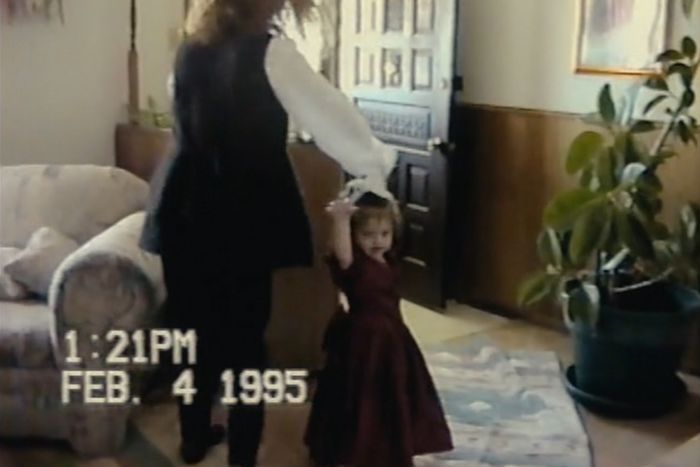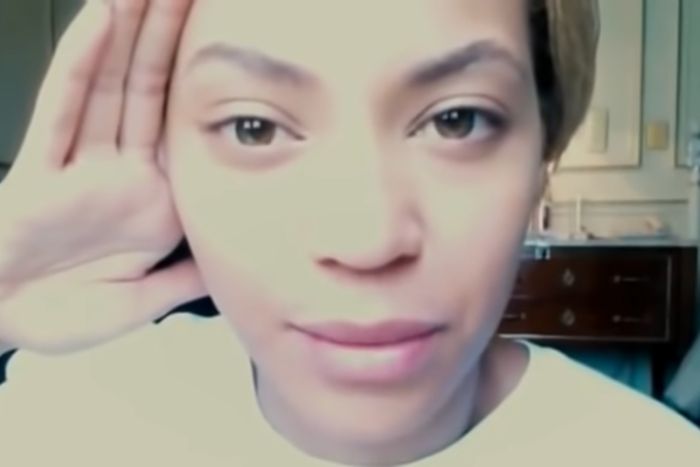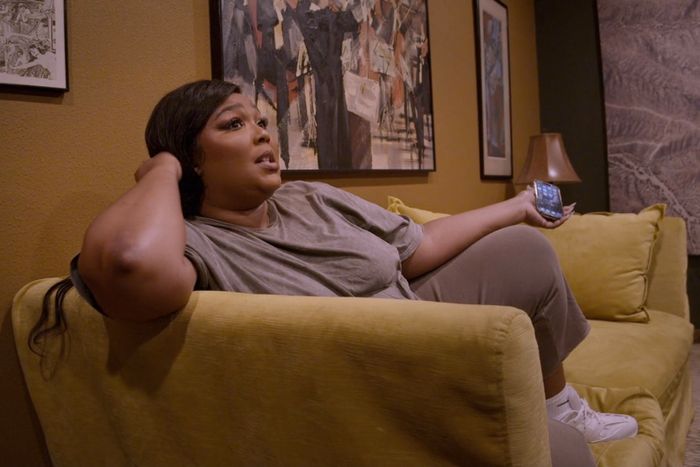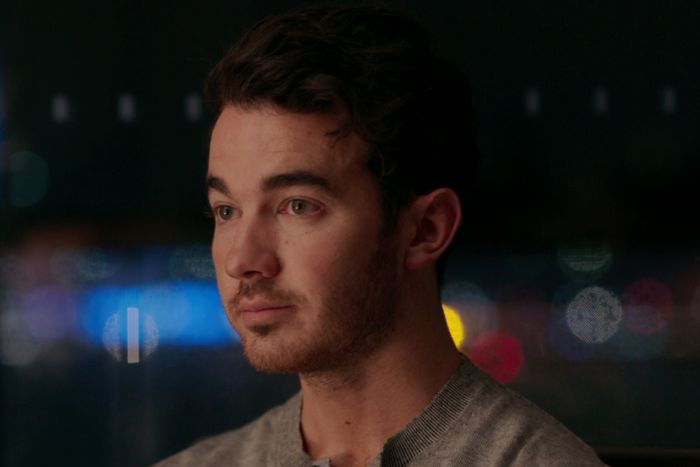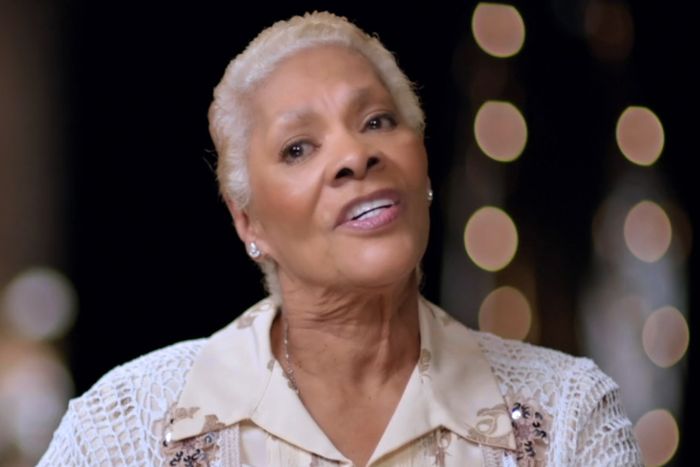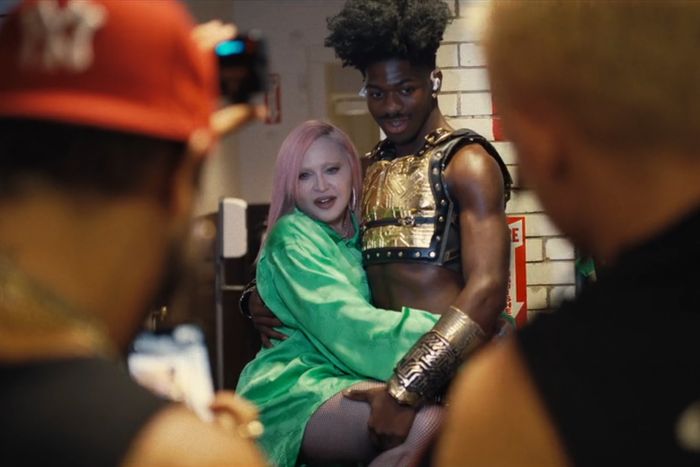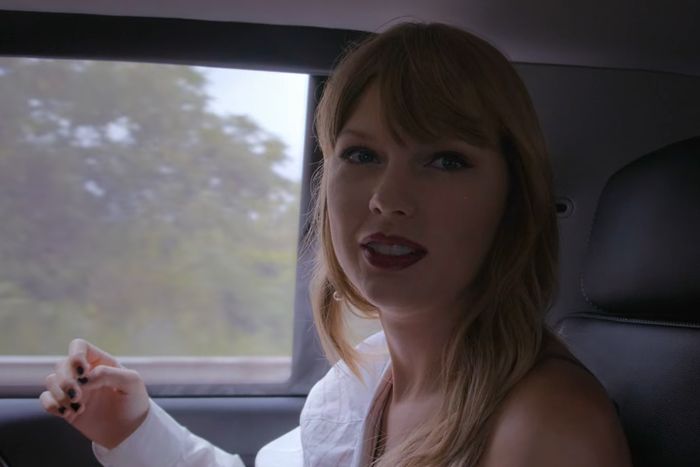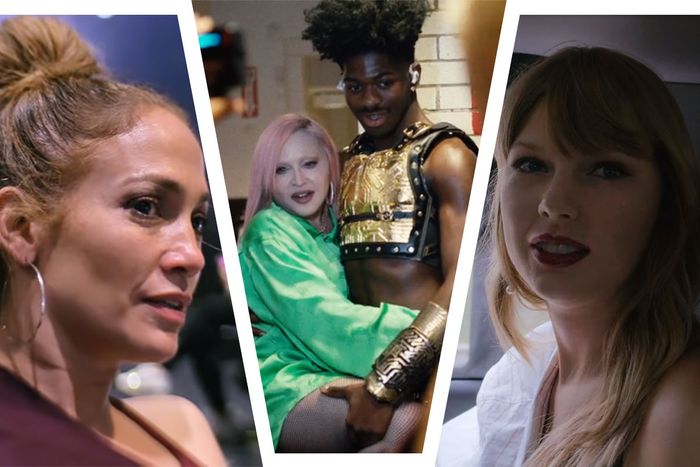
These films tend to follow a template: Cameras trail a singer through the recording studio or on tour. The subject speaks in dulcet tones about their life; tension is derived from the quest to exist as a public figure. There is footage from their childhood, brisk montages, and testimonies about the nature of fame — all aimed at making the artist seem grounded and even more worthy of adoration. (And you can bet that they, or their manager, will be credited as a producer.)
We’re in a boom time for the publicist-approved pop-star documentary. In the past four years alone, we’ve seen series and features about Jennifer Lopez, Taylor Swift, Billie Eilish, J Balvin, and many, many more. This year, we’ve already got Lil Nas X: Long Live Montero and Kings From Queens: The Run DMC Story (with more to come about Nicki Minaj, Brian Eno, Indigo Girls, Devo, and Céline Dion). Filmmakers have been profiling musicians for decades (even Bob Dylan agreed to a doc, with 1967’s Don’t Look Back), but the current formula kicked in just over a decade ago, established by early-2010s projects like Justin Bieber: Never Say Never and Beyoncé: Life Is But a Dream. Containing two or three headline-generating revelations, these films and series are mostly a way for artists to control their image from start to finish. How do you know if you’re watching one? Just look out for these key elements.
The Origin Story
Whether it includes grainy footage of a talent show, memories of the church choir, or a retelling of that one special moment when someone learned they could light up a room with song and dance, a story about the dawning of the artist’s talent is a must. Childhood, whether beatific or brutal, is framed as a source of drive and set to a wistful score. We might learn this via camcorder videos of a miniature frolicking future star, as in Selena Gomez: My Mind & Me, or present-day footage, as in Machine Gun Kelly’s Life in Pink, when the performer returns to the Cleveland block where he spent his teenage years.
Woe Is Fame
These docs make fame seem like torture. Paparazzi, loss of privacy, the challenge of staying sane while satisfying expectations — it’s enough to make a celebrity weep. In Life Is But a Dream, Beyoncé, master of the straight-to-laptop-camera soliloquy, urges herself to “stop pretending that I have it all together” — a sentiment that has become a staple of the genre. But all dragons must be slain by the third act. Cue the acceptance. As Demi Lovato says in Dancing With the Devil, “Life ebbs and flows. Life is fluid and I’m fluid and that’s all I know.”
Overcoming the Haters
Celebrities are attuned to public opinion — and they use their docs to address it in sweeping statements, lumping together malicious trolls and thoughtful critics. “You think username @fuckthatbitch has any authority on your existence and why you’re here?” Lizzo says of a TikTok assessment of her in Love, Lizzo. (TikTok turned out to be the least of her problems: The doc itself became the subject of a payment dispute with dancers who appeared in it, and three of her dancers have since filed a lawsuit against her.) Sometimes the value judgments they’re railing against come from the industry itself: In Miss Americana, a teary-eyed Taylor Swift responds to missed Grammy nominations by insisting, “I just need to make a better record.” Jennifer Lopez is almost believable in Halftime when she claims her Hustlers Oscar snub reminded her that the only reason she does any of this is “to tell stories and to effect change.” Haters become grist for the mill, emboldening fan armies to double down on their general’s behalf.
The Brief, Premeditated Truth
These projects often contain a few intimate disclosures, carefully meted out. Just one raw admission can lend gravity to an incurious film — as in Chasing Happiness, when Kevin, the Jonas Brothers’ perpetual third wheel, describes what it was like to see Joe and Nick performing their songs without him after the band split up. Sometimes the revelations are intense, as when Lopez divulges that her mother “beat the shit” out of her as a child. These confidences can feel designed to inspire headlines, as if the star worked with a focus group to determine the right morsel of truth and the perfect way to distill it.
A Touch of Politics
Finally, a way to talk politics without having to answer a journalist’s follow-up questions. Some stars are more committed than others: In Dionne Warwick: Don’t Make Me Over, the singer talks about becoming an AIDS activist in the ’80s. Even the usually apolitical Swift — who has cited what happened to the Chicks when they censured George W. Bush as a cautionary tale — has used a doc to speak out: In Miss Americana, she explains the political awakening she had when Tennessee senator Marsha Blackburn voted against the reauthorization of the Violence Against Women Act. Since most of the scenes in these docs take place in a hermetically sealed circuit of studios, stages, and residences, these kinds of statements introduce real-world stakes, so the heftiest insights aren’t about, say, the burden of fame.
Studio Magic
The star’s big realization in Shawn Mendes: In Wonder? “I’m just a guy who really loves music.” Well, they all are. Scenes of an artist in the studio underline their prowess and creative control. In Gaga: Five Foot Two, Lady Gaga and Florence Welch relish their piercing sing-off on “Hey Girl.” The Ed Sheeran documentary Songwriter concludes with his producers applauding a finished cut of “Shape of You.” (What we don’t hear are the misfires that got scrapped along the way — that kind of failure is not part of the process we’re allowed to witness.)
The Celebrity Encounter
The warning “Never meet your heroes” doesn’t apply to these people. When one pop star meets another in these docs, that interaction serves as an endorsement from a cherished forerunner. In Billie Eilish: The World’s a Little Blurry, Eilish meets, and spends several seconds locked in an embrace with, her childhood idol Justin Bieber. In Long Live Montero, Lil Nas X is rendered nearly speechless when he rounds a corner backstage and finds Madonna waiting to greet him before a show.
Back-Seat Confessions
One of the easiest ways to show a pop star’s life in motion is for them to say something profound in a car while traveling to or from an event. From the cushioned retreat of a moving vehicle, Swift reveals how she overcame an eating disorder. Lizzo discusses the on-and-off romance she catalogued on “Break Up Twice” and “Coldplay.” Lil Nas X would really like a piece of gum. These supposedly candid moments are distinct from the other supposedly candid moments because they have a sheen of spontaneity. Hit the road and the epiphanies come pouring out.


